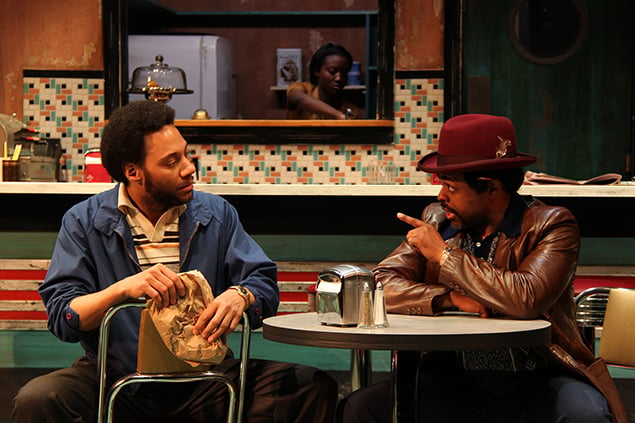The rush of delight comes just a few seconds after the lights go up on Round House Theatre’s crackling revival of Two Trains Running—the rush that a devout theatergoer experiences at the sound of playwright August Wilson’s verbal music, leavened with the sharp edge of his social observations, disguised as regular folks just talkin’. The talk goes on for about three hours and at Round House it is something to savor, thanks to director Timothy Douglas and a fine cast.
Wilson died in 2005 at age 60 and left behind a remarkable and much-honored play cycle about African-American life: one play for every decade of the 20th century, and all but one of them set in the historic inner-city Hill District of Pittsburgh.
In Two Trains Running the time is 1969. The place is a rundown diner. Economic decline has left it mostly patron-free, except for a few regulars who spend pennies on coffee, beans, or pie. The bulldozers of urban renewal await; the locale and its owner, Memphis (played with gruff passion by Jefferson A. Russell), have seen better days. Scenic designer Tony Cisek captures the frayed mood in the peeling paint and faded linoleum, accented with a few red vinyl booths, chairs, and stools. The old jukebox doesn’t work, and the chalkboard menu above the counter is misleading, as Memphis’s kitchen is out of most foodstuffs.
Memphis hopes the city will pay him $25,000 for the building, even though he bought it for much less. The prosperous undertaker, West (Doug Brown, playing it close to the chest in a black three-piece suit, gloves, and a bowler), is offering $15,000, which Memphis is loath to accept.
The denizens of Memphis’s cafe are poor, but they have dreams, most deferred and some still unformed. Holloway (the excellent Michael Anthony Williams) is the graying elder statesman, sitting in a side booth, playing a solo game of what might be dominoes, commenting on all that goes on. His mild manner peels away when he launches into a bitterly funny dissertation on white exploitation of African-Americans and later offers a stirring confession.
It is Holloway who repeatedly invokes the wisdom of the unseen Aunt Ester, a spiritual figure who looms over most of Wilson’s plays but who appears only in Gem of the Ocean, set in the early 1900s. A woman who is centuries old, according to legend, and lives in a Hill District flat, she carries within her the stories of all the slaves ever brought here from Africa and their descendants. She offers spiritual advice to those who, like Holloway, believe in her.
But spirituality and history are only two ingredients in the smorgasbord laid out in Memphis’s diner. KenYatta Rogers nearly steals the show in a comic turn as the local numbers runner, Wolf, a likable rogue in green slacks, a maroon print shirt, and a red fedora (the dead-on period costumes are by Reggie Ray), his hair heavy with product, a toothpick always between his teeth. He uses the pay phone in Memphis’s cafe to call in the numbers people bet, and he’ll sell a gun to anyone with cash.
The anyone in this case is a young ex-con, Sterling (Ricardo Frederick Evans), who’s halfheartedly looking for a job, though what he really wants is “a pocketful of money, a Cadillac, and a good woman.” Evans’s jumpy Sterling is a time bomb of youthful recklessness and bad judgment, but the actor plays him with flashes of empathy and promise. His yen for Risa (a slow-burning Shannon Dorsey), the emotionally guarded waitress/cook in Memphis’s cafe, might save him. Her legs covered with scars from wounds she self-inflicted as a preteen, Risa guards her emotions as closely as she rations sugar in the diner.
Bursting in at odd moments is Hambone (Frank Britton, in a heart-tugging portrait), a man with mental disability. “I want my ham! He gonna give me my ham!” he shouts over and over. “He” is the grocer who offered to pay with a ham if Hambone did a good job painting the grocer’s fence. The merchant viewed the job as just okay and offered Hambone a chicken instead, which he refused to take. It’s been nine years and Hambone still bedevils the grocer, who still offers him a chicken. Hambone serves as one of the playwright’s metaphors, evoking a people perpetually blocked from the center of American prosperity, but he works as a lone tragic figure, too.
An acting ensemble working in perfect harmony is crucial to Wilson’s plays. The digressions, repetitions, and interruptions must all flow into one another like musical themes and variations. And despite the occasional tripped word or mistimed interjection on opening night, they get it oh so right at Round House.
Two Trains Running is at Round House Theatre Bethesda through May 4. Running time is about three hours, including one intermission. Tickets ($25 to $50) are available via Round House’s website.
















